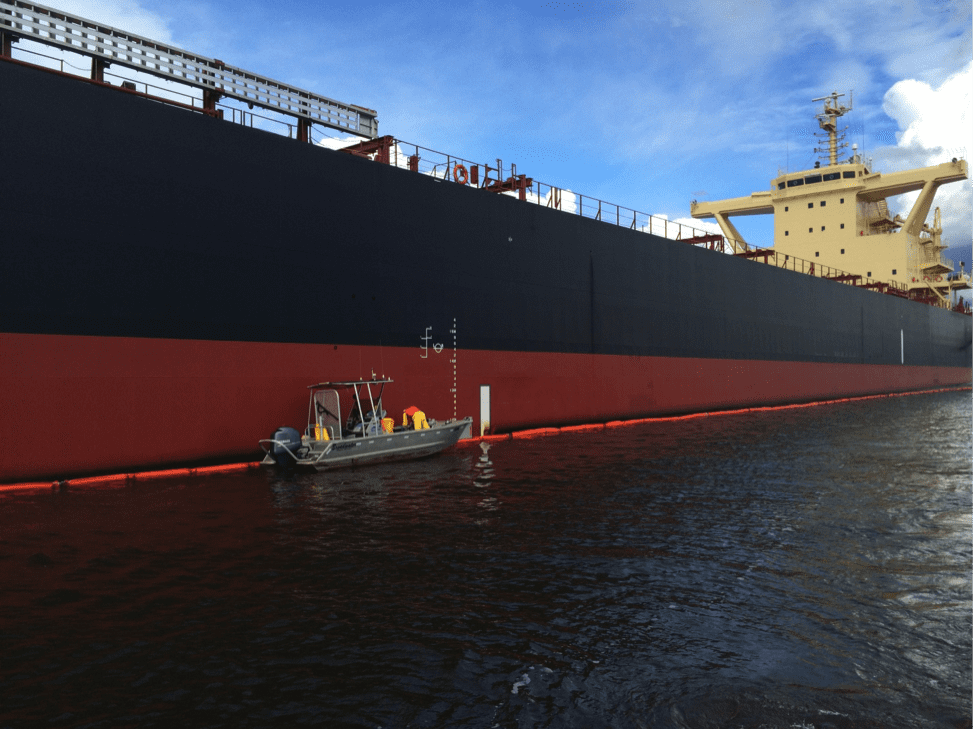Boom surrounds the MV Marathassa in English Bay, British Columbia. Photo: Canadian Coast Guard
Canadian Coast Guard Commissioner Jody Thomas issued statement Sunday defending the Coast Guard’s response to the bunker fuel spill from the MV Marathassa bulk carrier in English Bay, near downtown Vancouver. Below is her full statement:
April 12, 2015 – The Canadian Coast Guard was notified by municipal emergency services on April 8 at 5:10 p.m. that they received a report from a recreational boater of pollution in Vancouver Harbour with a slick around the bulk carrier Marathassa.
In instances of ship-source or mystery spills, the Canadian Coast Guard leads the coordination of the environmental response. By 5:14 p.m., the Canadian Coast Guard informed emergency management partners of the incident in accordance with recognized protocols, which inform local, shore-side authorities such as municipal governments and First Nations. At 6:08 p.m., the Canadian Coast Guard had given advanced notice to Western Canada Marine Response Corporation (WCMRC) to stand-by for a potential response, consistent with established practices. WCMRC was officially activated at 8:06 p.m. and their crews arrived on scene at 9:25 p.m. with multiple vessels.
At 5:38 p.m., a harbour vessel for the Port of Vancouver had confirmed an unrecoverable minimum sheen was in the Bay, but the Canadian Coast Guard performed its own assessment over the next hour and determined the spill was more serious.
All through the night, the Canadian Coast Guard and WCMRC worked to ensure a robust response, following long-standing protocols. Our partners carried out skimming in the dark and completed securing boom around the vessel by 5:53 a.m. Even before most British Columbians woke up, the boom was completely surrounding the suspect vessel.
80 per cent of the spill was not only contained, but was recovered within 36 hours. A National Aerial Surveillance Program flight during the afternoon on April 11 confirmed that the oil on the water had been contained, and that approximately 0.3 litres of non-recoverable oil was remaining on the water.
The Canadian Coast Guard’s response to the Marathassa spill was exceptional by international standards, a fact corroborated by a U.S. oil spill expert. Now that the Marathassa is confirmed as the source of the pollution, Canadians should be assured that the owner of the vessel is responsible for covering the costs of the operation. The Government of Canada put a number of measures in place to prevent and respond to oil spills; one of those is polluter-pays legislation.
I would like to respond to speculation in the media and confirm that the Kitsilano station never provided these types of environmental response operations, and its presence would not have changed how we responded to this incident.
In fact, in British Columbia, the Canadian Coast Guard Western Region maintains marine pollution response equipment in three major centres (Prince Rupert, Richmond and Victoria) and equipment caches in 12 other communities. These caches contain a variety of response equipment including boom, skimmers, storage tanks, protective gear, vessels, and other supporting equipment to handle a wide range of different situation.
Moving to the next phase of dealing with this incident and shifting our focus to the shore-based clean-up efforts, the Canadian Coast Guard remains committed to leading solid and concerted efforts with our partners to protect the safety of Canadians and our environment from the effects of this spill. I would like to thank our partners for their assistance and support, and will continue to include other levels of government, stakeholders, communities and Aboriginal groups in all of our discussions so they are aware of any developments.
As we would for every significant incident, and as previously committed, the Canadian Coast Guard and its partners will perform a complete analysis of the entire response to this incident, from the initial call, to the official end of the operation.
The Government of Canada has made unprecedented investments to renew the Canadian Coast Guard’s fleet to secure the safety of Canadians and our environment.
Canada has one of the strongest marine safety regimes in the world, and as Commissioner of the Coast Guard, I remain committed to ensuring the safety of Canadians in our waters and protecting our marine environments.

 Join The Club
Join The Club











